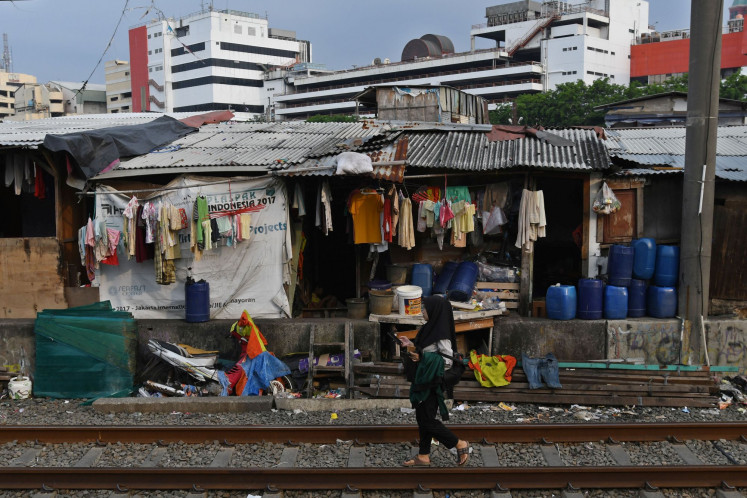Popular Reads
Top Results
Can't find what you're looking for?
View all search resultsPopular Reads
Top Results
Can't find what you're looking for?
View all search resultsOverloading, fatigue main factors in truck accidents
Motorists fear for safety amid rising crash rate Fatal accidents involving trucks in Tangerang, Banten, late in July and another one that occurred a week later have put a spotlight on the lack of safety measures regarding freight trucks that are the backbone of trade and development in the country
Change text size
Gift Premium Articles
to Anyone

Motorists fear for safety amid rising crash rate
Fatal accidents involving trucks in Tangerang, Banten, late in July and another one that occurred a week later have put a spotlight on the lack of safety measures regarding freight trucks that are the backbone of trade and development in the country.
The first accident occurred on July 31, which saw a car crushed flat after a soil-loaded truck fell on it, killing four people, namely Edy, the app-based taxi driver, and passengers Wandi, Nanda and Fatmawati. The fourth passenger, Fatmawati’s one-year-old daughter, survived the accident.
The police later declared the case as one of negligence and named the truck driver a suspect.
Meanwhile, no casualties were reported in the second incident that occurred on Aug. 6 where a white minivan was left severely damaged after it collided with a truck loaded with hebel blocks on Jl. Raya Pembangunan Tiga in Neglasari, Tangerang, Banten.
The two accidents have raised concerns about the danger of freight trucks as they evidently pose a threat to other vehicles on the road.
Juliana Ekaputri, a motorcyclist from West Jakarta, said she was getting more worried about riding her bike around trucks after learning about the accidents.
“Riding my motorcycle next to trucks makes me very uncomfortable. They are slow and difficult to overtake, while their engines are noisy,” she told The Jakarta Post.
Naditya Fitriyani, a car driver from Bogor, West Java, said she had become more cautious when driving next to freight trucks and would try to avoid them.
Jakarta Police traffic law enforcement unit head Adj. Sr. Comr. Muhammad Nasir said there were 243 truck accidents in Greater Jakarta last year, accounting for 4.11 percent of the 4,286 traffic accidents in the area. Meanwhile, a 2017 study of state-owned toll road operator PT Jasa Marga revealed that 64 percent of accidents on highways involved freight trucks.
Indonesian Truck Operators Association (Aptrindo) deputy chief Kyatmaja Lookman said the high accident rate involving trucks was mostly caused by the common practice of overloading trucks.
“Based on data from state-owned surveyor PT Sucofindo in 2017, around 80 percent of trucks operating in Indonesia were overloaded and overdimensional,” he told the Post on Friday last week.
“The number went down to 70 percent last year when the government imposed stricter punishments for overloaded trucks, but the number of violations has recently been on the rise,” Kyatmaja said.
The Transportation Ministry started taking legal action against overloaded and oversized trucks in August last year. Sanctions range from ticketing and instruction to remove excess freight to prosecution. However, Kyatmaja said the rules had not been effectively implemented.
He said overloaded trucks not only damaged the road and caused traffic congestion but also made trucks less safe.
“It could cause overheating of the brakes, increase braking distances, damage wheel axels and change the truck’s center of gravity,” Kyatmaja said, referring to the point at which weight is evenly dispersed and all sides are in balance.
“When the truck’s center of gravity changes, it could easily flip or tip to its side after a sharp maneuver or whenever there is strong wind,” he explained.
He, however, admitted that even though both drivers and truck operators knew the danger of overloaded trucks, they could not refuse when companies asked them to deliver overloaded consignments.
“If you don’t want to carry the amount requested by the customer, they could find another company that will do,” he said.
DJD, who has been driving trucks for 19 years, confirmed that nearly all the consignments he had delivered were overloaded.
“Whenever I drove overloaded trucks, the company always gave me more money to bribe weigh station officials and police officers. I usually gave Rp 100,000 [US$8] to police officers who wanted to ticket me,” the 48-year-old said.
Aril, a driver from South Sumatra, said he used to bribe weigh station officials at least Rp 100 for each kilogram of his consignment.
He said that he had stopped driving overloaded trucks for safety reasons, but revealed that a lot of other drivers in Sumatra still do.
Deputy chairman of the Indonesian Transportation Society (MTI) Djoko Setijowarno said violations of the maximum consignment regulation were mainly triggered by the country’s dependence on land transportation. (nal)









